Emptier streets in parts of Kuala Lumpur as migrants shy away after raids targeting illegal foreign workers
Locals in these areas, however, are largely unperturbed by the presence of the migrant workers, with some traders also saying that they contribute significantly to the businesses there.
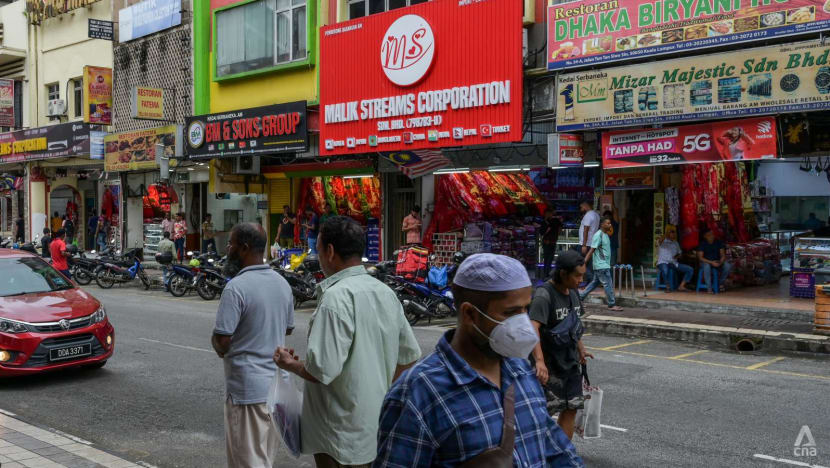
Foreign workers are seen at Jalan Silang in Kuala Lumpur on Jan 9, 2024. Malaysian authorities have in recent weeks conducted several raids in the area that has been dubbed as "Mini Dhaka" by locals. (Photo: CNA/Fadza Ishak)

This audio is generated by an AI tool.
KUALA LUMPUR: Just a few weeks back, the Jalan Silang area in the heart of Kuala Lumpur was teeming with migrants - from Bangladesh, Nepal and Myanmar among others - during the weekends and public holidays.
For many of these migrants, congregating together at this location was one way for them to feel at home in a foreign land, and to catch up with friends.
They also take the opportunity to run their weekly errands in the area, which is a short walk from Chinatown and a five-minute drive from the glittering Petronas Twin Towers.
These migrants form a substantial workforce in Malaysia, especially in the so-called “3D” – dirty, dangerous and demeaning – jobs that are usually shunned by locals.
According to the Malaysian Department of Statistics, there were around 2.2 million documented migrant workers in Malaysia as of 2022, or about 15 per cent of the total labour force.
This does not include the number of undocumented migrant workers in the country.
But a series of raids by the Malaysian authorities targeting undocumented immigrants as well as other illicit activities have left the streets in parts of the capital city - including the Jalan Silang area - largely void of people.
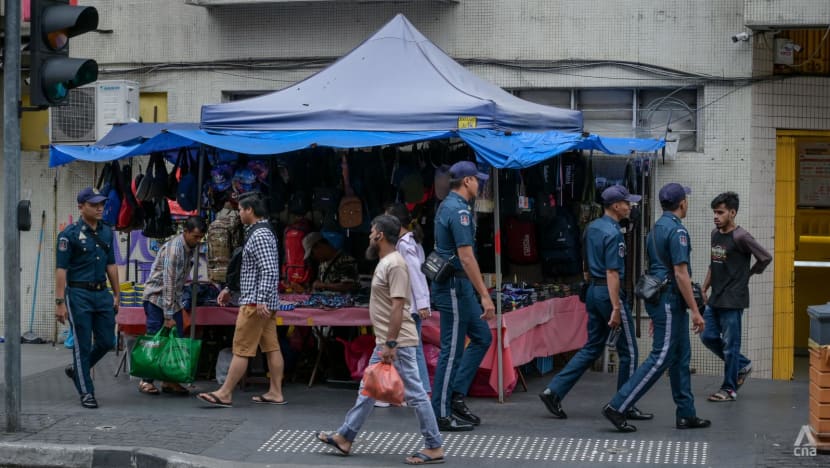
On Dec 21, more than 1,000 law enforcement personnel - including members of the General Operations Force (GOF) - were involved in the operation in Jalan Silang. The GOF is the light infantry arm of the police force.
According to media reports, more than 1,000 migrants were detained for various offences.
Since then, raids have also been conducted at several areas in Malaysia’s capital city such as Brickfields, Petaling Street, and the Kuala Lumpur City Centre (KLCC) among others.
The Immigration Department also detained almost 300 undocumented migrants in Kota Bahru, Kelantan on Jan 5 while on Jan 9, it detained 67 foreigners working in seven massage parlours and hair salons in Johor Bahru.
News agency Bernama reported that all the foreigners detained in Johor Bahru were found to have been using social visit passes and temporary work passes registered to other employers, while some did not have valid travel documents.
The Immigration Department has said that their operations were based on complaints from the public.
The Malaysian authorities conduct raids every now and then. The Jalan Silang raids were one of the highest profile operations of late since 2020, when thousands of migrants were detained in a series of raids in the country during the onset of the COVID-19 pandemic.
Many migrants - including those with valid documents - are now afraid to leave their homes to come out, including to the area in Jalan Silang that has been labelled “Mini Dhaka”, for fear of being swooped up by the authorities.
Locals have dubbed the area “Mini Dhaka” - in reference to Bangladesh's capital city - due to the influx of migrants there.
The raids have cast a spotlight on the rising anti-foreigner sentiments in Malaysia, an issue that is exacerbated by some individuals on social media platforms like TikTok.
But some locals in the areas where the raids have occurred told CNA that they are largely unperturbed by the presence of the migrants, with traders also saying that they contribute significantly to the businesses there.
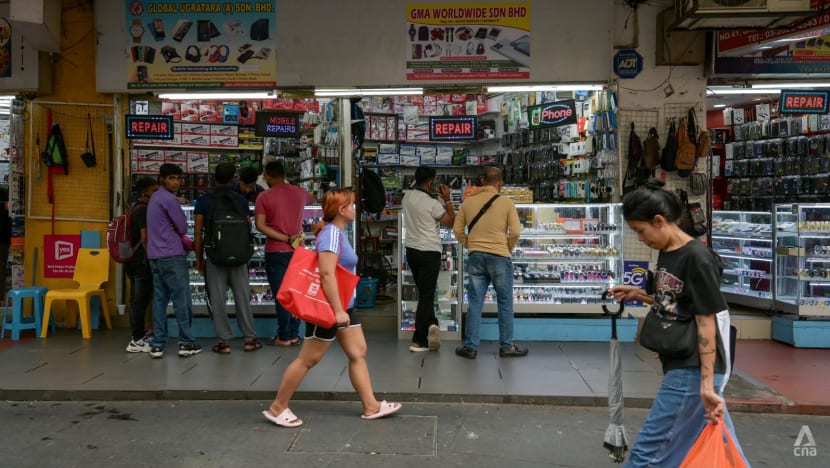
BUSINESS DOWN FOLLOWING RAIDS
Several local traders that CNA spoke to in the Jalan Silang area said that they have been adversely impacted by the raids, especially as the migrants form a significant chunk of their customer base.
The shops there sell items such as comforters, watches, top-up cards, clothes and luggages among other things.
There are also restaurants, money remittance services and grocers, with the latter stocking products that have been imported from Bangladesh and Myanmar.
One trader who wanted to be known as Mr Azman, 40, said that business has dropped by almost 70 per cent since the raids happened a few weeks back.
“It’s just that (the migrants) are coming from all over Klang Valley to meet (here) during weekends, similar to what Malaysian youngsters used to do in the 1990s.
“Maybe people are just afraid when they see many of them together, but generally they don’t create any trouble,” he said.
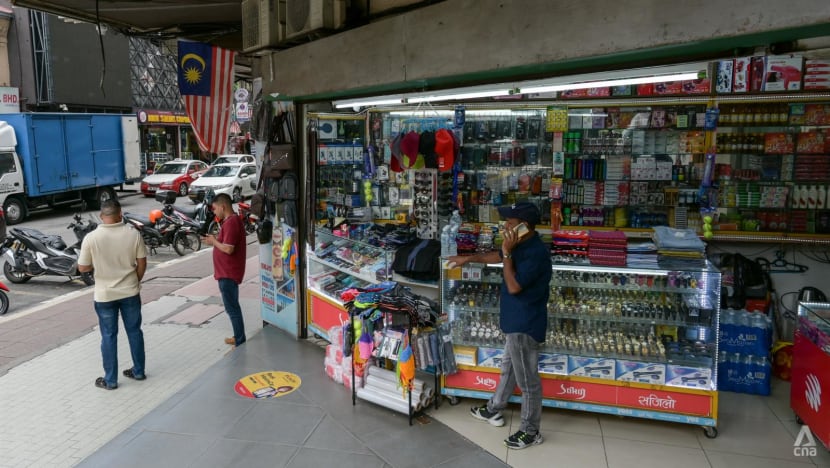
Deputy Inspector General of Police Ayob Khan Mydin Pitchay said on Dec 29 that the police had identified more than 10 colonies of undocumented immigrants and planned to conduct their operations in due time.
He was quoted as saying by the New Straits Times that the operations would not only focus on the Klang Valley but would be extended to Johor, Kedah, Kelantan and Sabah.
The Kuala Lumpur City Hall themselves conducted an operation at the Jalan Silang area, as well as in the nearby vicinity, on Jan 5 where they inspected various business premises.
MIGRANTS AFRAID TO COME OUT
Mr Mohd Kasim, a migrant worker from Bangladesh, said that since the recent raids, many of his friends are afraid of leaving their homes except to go to work.
“This is the place for them to buy items from their homeland, to remit money back, to meet their friends or to even buy air tickets,” said Mr Kasim, 33, who has been in Malaysia for more than six years.
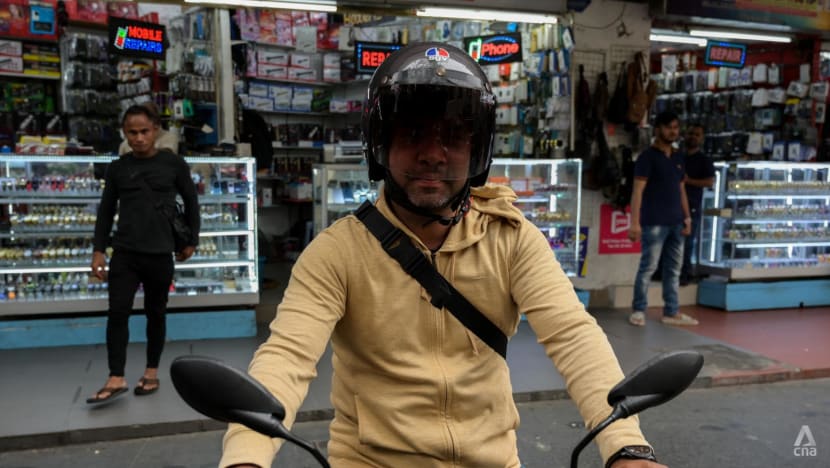
With a looming threat in the shadows, Mr Kasim said that it was better for them to stay put at home than risk going out recreationally.
“Even those who have documents are afraid that they will get picked up for a few hours before being released,” said Mr Kasim.
“As a foreigner I know that I must respect the local laws and ways. I just don’t want any trouble and only want to earn a living.”
Mr Saiful Islam - a migrant worker employed at one of the shops in Jalan Silang - told CNA that he might consider relocating to Dubai in the United Arab Emirates where his elder brother is should his employer’s business woes continue as a result of the raids.
“Many people told me that Malaysia is very good but at the moment it is very difficult for us,” the Bangladeshi said, adding that he has a passport and valid working permit.
Sabahan Rahman Abdullah, 66, who works at a shop selling watches and phones, told CNA that businesses in the area employ migrants so that they are able to interact with their customer base who are mainly made up of their countrymen.
“Even if they employ locals here, they wouldn’t understand the Bangladeshi language. These people are contributing to the local economy as well,” said Mr Rahman, pointing to a branch of Agrani Bank, a commercial bank that is owned by the Bangladeshi government.
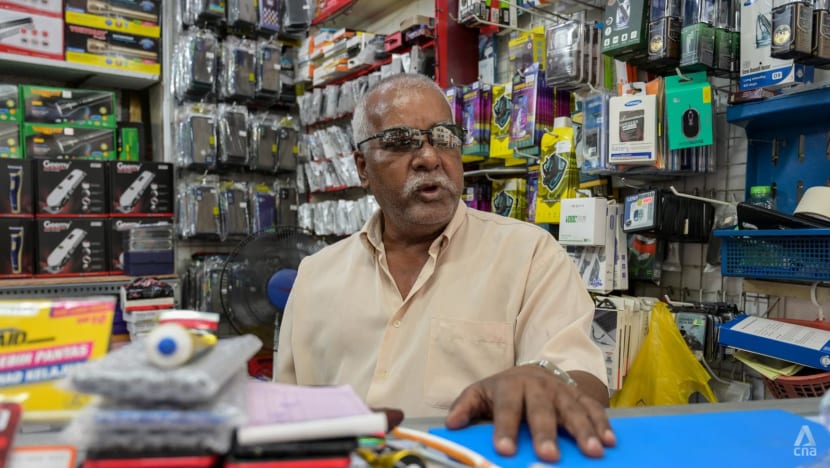
A Malaysian working in one of the grocers in Jalan Silang said that the area came up a few years ago after being abandoned. The shop stocks many items from Myanmar.
“This place was dead once upon a time, but they have made the area active economically. People don’t consider that aspect,” said the store worker who did not want to be identified because of the "sensitivity" of the situation.
He added that two of the migrant workers in the shop had been detained during the Dec 21 operations but were released once their documents had been checked.
“Why are those with documentation also being harassed,” he asked.
He also questioned what right individuals had to go around and ask for the documentation of migrants and refugees, referring to Malaysian TikTok influencer Sophian Mohd Zain who has been on the forefront of tirades against these groups of people.
ANTI-IMMIGRANT SENTIMENT RISING, EXACERBATED BY SOCIAL MEDIA
In his videos, Mr Sophian - who has been accused of stirring up anti-immigrant sentiments - goes up to migrants who work in restaurants or grocers and questions them on their right to work in Malaysia.
He has been filmed in Kuala Lumpur, Melaka, and Penang among other places and has also ambushed areas that have large populations of Rohingya refugees.
Some of his videos posted on TikTok have racked up hundreds of thousands of views.
His actions have generally been supported by many people who tell him to keep up his work.
“We love our country, so this has to be done. The foreigners are getting big headed and taking advantage. Continue the good work,” read a comment on one of his videos taken at Jalan Silang.
Mr Sophian, who heads a non-governmental organisation called Surplus, told CNA that he was only against undocumented migrants in the country as well as businesses that were owned by them.
He also takes issue with businesses that hire migrants and place them in front-facing positions such as cashiers, claiming that this takes away jobs from locals.
“Every country has laws and any foreigner who wants to come into the country has to abide by the laws," said Mr Sophian.
He further claimed that his “ambushes” have been ongoing for more than a year to put pressure on the government to take action.
“This is a critical issue and I want Malaysians to see what is really happening on the ground. If I make a complaint online, it will take a long time for any action to be taken,” he said, adding that he believed the raids in Jalan Silang for instance were conducted after his “ambushes”.
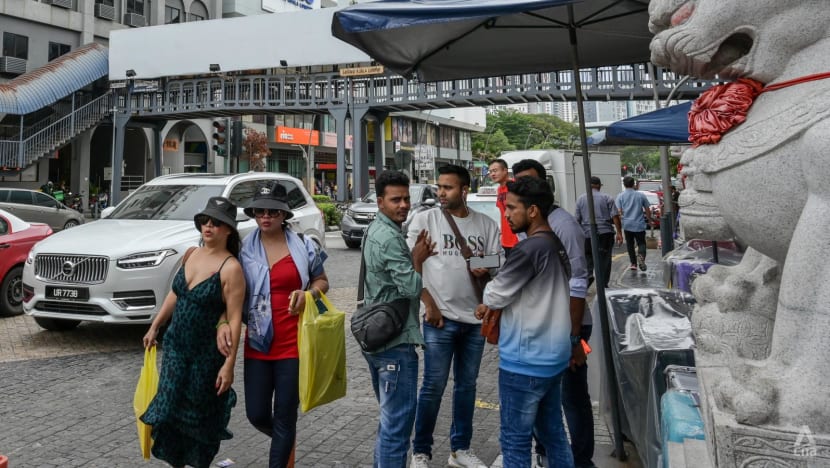
Migrant rights activist Joseph Paul told CNA that the raids were not going to solve the root cause of the problem, claiming that the issue has been around for ages because of state policies that have not been implemented as well as corruption.
He also said that xenophobia was displayed against migrants, and that a large number of them were undocumented because they themselves were victims of human trafficking.
“Thousands come here with valid documents but have been cheated by their employers. How often have (the authorities) conducted these raids?
“At the end of the day, do we want the workers or otherwise? What is the policy? Establish a long-term policy and work towards it,” said Mr Paul.
Mr Azman, the trader in Jalan Silang, does not see the migrants as taking away jobs from the locals.
Acknowledging the substantial number of migrants that work in the area, Mr Azman questioned whether Malaysians would be willing to do the same job for a minimum wage of RM1,500 (US$323).
“Who is going to do those jobs? They would rather work in McDonalds. As long as the (migrants) have permits and the proper documentation, I don’t see any issues,” he said.

















